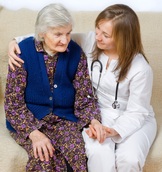Ageing and geriatric medicine should be taught to undergraduate doctors to improve attitudes

More time should be devoted to teaching medical students how to interact with older patients to prepare the medical workforce for the needs of an ageing population.
International journal Age and Ageing has published a report calling for more to be done to improve attitudes towards older people by healthcare professionals during their training.
The British Geriatrics Society’s research journal has published recommendations on what should be taught to medical undergraduates to improve the standard of treatment older people currently receive from doctors.
Dr. Adam Gordon, corresponding author and honorary secretary of the British Geriatrics Society said: "If we are to prepare our workforce for the future we need to devote more time to teaching medical students about how to manage older people with frailty."
The report hopes better education will give medical students a true understanding on the potentially different perspective of older people in their care.
Highlighting that many older people benefit from whole person-centred care, the paper’s authors want to see students taught alongside other medical professionals to learn how to work within a team. The report said it is crucial to teach medical students how joined up care can better meet the needs of older patients.
The report claimed: “There are now very clear guidelines, drawn up by experts in the care of older people, both within the UK and across the EU, about what we ought to teach medical students about ageing and geriatric medicine.
“There is strong evidence to suggest that medical schools are not delivering enough teaching about ageing and geriatric medicine. This is not unique to the UK but the UK is no better than other countries in this regard.
“If we are to prepare our workforce for the future we need to devote more time to teaching medical students about how to manage older people with frailty.”
The worldwide number of people aged over 60 is projected to rise from 605 million in 2000 to nearly two billion by 2050. The British Geriatric Society believes all people should have access to fair and equal assessment, diagnosis and treatment regardless of their age and has over 3,000 members worldwide offering specialist expertise about the medical needs of older people.
Latest News
 29-Jul-24
Dementia Bus gives carehome.co.uk staff insight into life with dementia
29-Jul-24
Dementia Bus gives carehome.co.uk staff insight into life with dementia
 01-Mar-24
Find out the top care homes in 2024
01-Mar-24
Find out the top care homes in 2024
 21-Mar-23
UK's top care homes in 2023 revealed
21-Mar-23
UK's top care homes in 2023 revealed
 03-Jan-23
carehome.co.uk launches free care helpline
03-Jan-23
carehome.co.uk launches free care helpline
 13-Dec-22
5 mins with Emily Whitehurst, chief operating officer for Constantia Healthcare
13-Dec-22
5 mins with Emily Whitehurst, chief operating officer for Constantia Healthcare